Do you ever feel like you have to take care of everyone else before you can take care of yourself?
I often feel that way.
Many women experience what I call Caretaker Syndrome. We are masters of taking care of our people and all the things—the husband, the kids, the parents, the house, the laundry. Fix the meals and feed the dog.

Have you neglected to take care of you?
Has anxiety crept into your life more than you’d like to admit? Have you put off caring for your soul, feeling the drain on your resiliency and strength?
Taking care of everybody else is what we do. And we do it well.
Until we don’t.
Until we can’t.
Until we. . . deplete our emotional strength. Experience a meltdown. Pitch a fit.
Or what ever our go-to fix is when anxiety robs us of our best self.
We put off seeking help until later. We promise to care for our soul needs when there’s time left over. Time doesn’t come in leftovers.
[tweetthis hidden_hashtags=”#emotionalhealth #overcomeanxiety”]The best time to deal with anxiety is now.[/tweetthis]
Taking Care of You is Important
Learning to attend to our needs, physical, mental, emotional, and spiritual is a crucial aspect of soul care. Don’t lose yourself in caring for others. Don’t discount the toll anxiety may be making on you.
Friend, it is so easy to do.
I recently had the opportunity to join Elizabeth Meyers on the Resilient Life Hack Podcast. We had an impactful conversation about overcoming anxiety and life hacks for spiritual resiliency. If you’ve been around here long, you know that anxiety is part of my story. You can watch the podcast at the end of this post.
Anxiety doesn’t define me, but it is something I’ve struggled with. I tell the full story in the first chapter of my book—how anxiety and fear left me afraid to go out or to stay in. How excessive adrenaline that raged through my system due to Grave’s disease left me sleepless for months. You can read that first chapter here.
For me, there was a physical cause to my fear, but it’s important to know that anxiety has many faces and many causes. During those days, I tried hard to care for my three little children and do all I normally did. Over time, medical help settled my thyroid, but anxiety carved deep pathways of fear that I didn’t address for many years.
Beyond admitting anxiety.
Effective soul care involves going beyond naming our particular struggle. For me, it was anxiety. For you, it may be something else. These concepts apply to any life-sapping struggle we are tempted to ignore.
To often we have a “name-it and claim-it” mentality with our soul struggles. Our fear. Our insecurity. Our perfectionism. Our co-dependency or addictions. The messy parts of our lives—we know they are there. We may name them. And then we claim them by allowing the struggle to shape, dictate, and define us in the silent conversations we hold with ourselves.
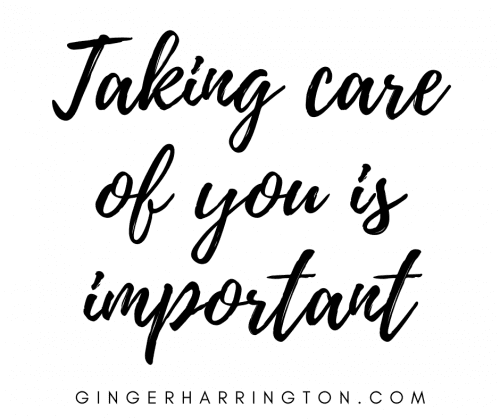
We keep caring for others, but neglect to attend to our deeper challenges.
To admit we struggle is only part of an important life hack. Here’s the part where freedom and healing are found: we need to share our struggles and take active steps to seek support. Seek help for struggles that rob us of wholeness, health, or well-being.
Soul care comes when we no longer ignore or discount our struggles.
After battling anxiety through thyroid disease during a cross-country move in 2000, I went through three more moves. California to Virginia. Virginia to Okinawa, Japan. Okinawa back to the states.
Each transition sent me spiraling back into the previous pattern of deep anxiety even though my thyroid operated at normal levels. The physical, mental, emotional, and spiritual responses were the same.
[tweetthis]Fear and anxiety left unchecked takes on a life of it’s own. Isn’t it time to take care of you?[/tweetthis]
When we fail to attend to our souls, struggles continue to rob us of strength and peace, often when we most need resiliency.
The road to help doesn’t have to be long.
It took me 13 years to finally seek help and healing for my anxiety. Why? I’m not really sure. I discounted the impact of my struggle and I ignored my needs. It was easy to do because my fears were more situational rather than constant. On some level, I believed there was just something broken in me, prone to anxiety and insecurity that ramped up during times of transition and uncertainty.
I labeled myself, “I’m just an anxious person.” (There’s that claim-it thinking again…)
Maybe I didn’t really believe God would help me overcome my fears. We think a lot of things that aren’t true when our emotions drive faith. Have you noticed that?
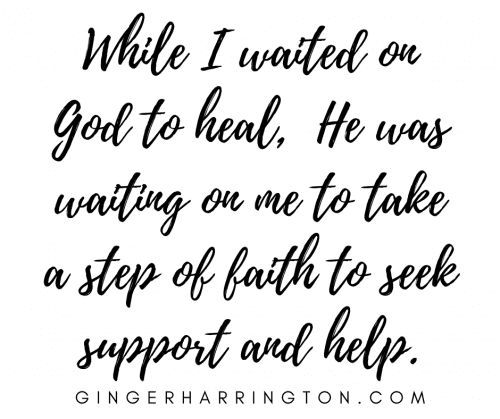
There are many uncertainties to feed fear during these unprecedented days of COVID, social distancing, economic shutdowns, racial strife, and high-stakes elections. Now more than ever, it’s important to identify anxiety and seek support or help.
Friend, don’t suffer in silence. Please don’t.
Let go perfectionism and the desire to control.
Make an intentional choice to trust God moment by moment. Rely on the life of Christ and the resources of Christ.
When we rely on ourselves rather than trust God, perfectionism can feed anxiety. Afraid of failure or rejection, we perform to feel safe. We try harder to control things we can’t control.
We try to fix ourselves, make ourselves follow all the rules, do all the things and get it all right, all the time. That’s so much pressure. We’re just not designed emotionally, neurologically, physically, or spiritually to be perfect or to control all things.
We’re not made to run at 110 miles an hour, seven days a week, 365 days a year, every year of our life. It just doesn’t work.
As Dallas Willard once wrote, “You’re a soul made by God, made for God, and made to need God, which means you were not made to be self-sufficient.” Making intentional choices to trust God in the moment reminds us that we don’t have to be in control.
Be patient with yourself for healing happens one day at a time.
As we depend on God to bring healing, to transform our minds, and develop our character, we grow at God’s pace. We learn to trust God with our deepest needs.
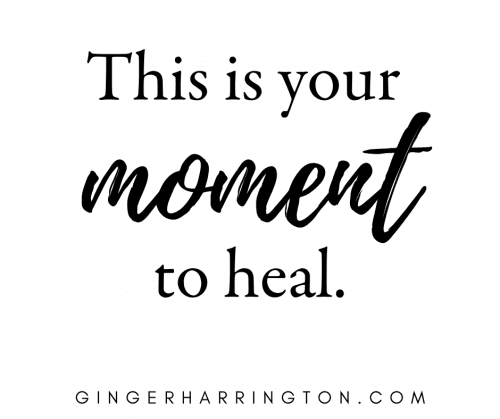 We begin to remember that we have the Holy Spirit to help us. We begin embrace to the truth that our Heavenly Father will never leave nor forsake us. As we gather courage to address our pain, we begin to live in light of the truth of our identity in Christ.
We begin to remember that we have the Holy Spirit to help us. We begin embrace to the truth that our Heavenly Father will never leave nor forsake us. As we gather courage to address our pain, we begin to live in light of the truth of our identity in Christ.
For more help with addressing anxiety, consider these resources:
[wpdevart_youtube caption=”” align=”left”]MecYCxMV84g[/wpdevart_youtube]
How to Cope with Fear, Worry, and Anxiety –guest post and video interview with Dr. Michelle Bengtson
10 Free Resources for an Emotionally Healthy You
7 Holy Habits for Emotional Health –guest post at Living By Design Ministries
5 Powerful Choices to Free Your Heart from Fear
COVID-19 and Your Mental Health–Mayo Clinic article
Breaking Anxiety’s Grip, book by Dr. Michelle Bengtson
Holy in the Moment, book by Ginger Harrington, chapters 1, 5, 9, and 10 address anxiety. Read a free chapter one with the story of my struggle with anxiety here.
Free Emotional Health Workbook

Disclosure: This post may contain affiliate links. That means, I may earn money or products from the companies mentioned in this post at no cost to you. Read my full disclosure here.


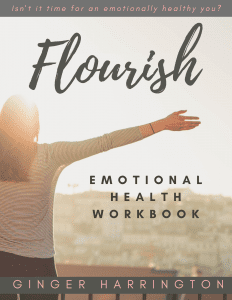
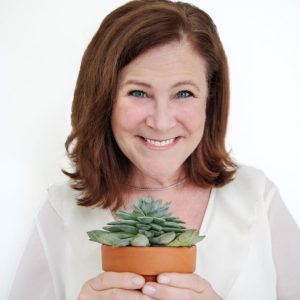 So glad you're here. I help busy women—gals like you— build healthy habits for living well with biblical wisdom and practical steps to deepen your faith, increase your hope, and thrive in your purpose.
So glad you're here. I help busy women—gals like you— build healthy habits for living well with biblical wisdom and practical steps to deepen your faith, increase your hope, and thrive in your purpose.

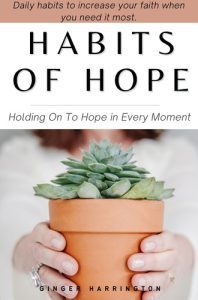


I love that quote by Dallas Willard! Yes, it’s so easy to let our anxieties take over and we never stop to consider there’s a way to control them! I resonate so much with what you’ve said about relying on the Spirit to heal and reinvigorate us each day. It’s always a struggle, but with God’s help we can be victorious!
Amen, Sister! When anxieties multiply, that is the time to invite the Holy Spirit into the moment and receive his strength and peace. I’m discovering that often there is a space between my prayer and God’s answer. Trusting him with the process, whatever it may look like in the moment is one of the ways God has taught me to surrender my expectations to him. Blessings to you today.
How I wish I had believed this years ago. I waited far too long to surrender it all to God and allow Him to heal me and give me the peace He wanted. The old struggle still flairs occasionally but it doesn’t linger like it used to. Thanks for inspiring us with the truth of God’s Word. Blessings!
Hi Deb! You’re right, the old struggle resurfaces from time to time, but when we address our fears, God teaches us new ways of navigating uncertainty. Thanks for adding to the conversation today with the important truth.
I love so many things about this! Thanks for sharing and for the reminder to depend on the One who is trustworthy and faithful!
I’m so glad this post resonated with you, Kristin. Keeping our focus on Christ empowers us to receive what we need to stand firm when anxiety comes knocking. Thanks for joining us today!